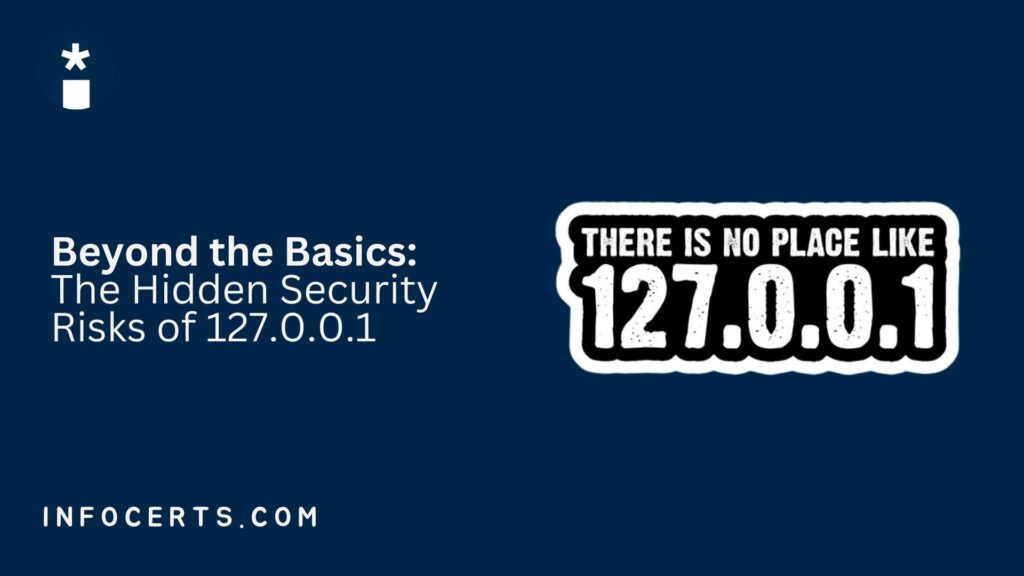You might think the internal address “127.0.0.1,” also known as localhost, is a safe haven from hacking attempts. After all, it refers to your own computer, right? While that’s generally true, the reality is more nuanced. Hackers, both external and internal, can exploit vulnerabilities related to Security risks of 127.0.0.1 to gain unauthorized access and wreak havoc. Learn more with CEHv12 Trainings from Infocerts
Beyond the Basics: Understanding Security risks of 127.0.0.1Think of 127.0.0.1 as a closed circuit within your computer. Traffic sent here stays within your system, used for testing and internal communication. So, how can external hackers possibly target it?While direct attacks from the outside are unlikely, there are indirect routes:
- Malware Infection: A sneaky malware program on your device could exploit weaknesses in applications or services running on localhost, potentially allowing unauthorized access or data exfiltration.Social Engineering: Clever phishing tactics or malicious websites might trick you into giving away sensitive information or installing malware that compromises localhost security.Supply Chain Attacks: Downloading and running untrusted software can harbor vulnerabilities attackers can exploit to access your system, including localhost resources. The Insider Threat: When the Wolf is in Sheep’s ClothingThe real danger often lurks closer than you think – internal actors with malicious intent. If someone already has access to your network, they can exploit Security risks of 127.0.0.1 in more targeted ways:
- Misconfigured Services: Weaknesses in configuration or access controls of localhost services become easy targets for insiders, granting them access to sensitive data or functionalities.Lateral Movement: Once inside, attackers can use localhost as a springboard to move deeper into the network, compromising other systems and escalating their privileges.Data Exfiltration: Insider attacks often aim to steal sensitive information. Localhost services might hold valuable data, making them targets for discreet exfiltration attempts. Battling the Threats: Proactive Measures for DefenseDon’t despair! Here are some effective ways to fortify your defenses against both external and internal threats targeting 127.0.0.1:
- Patch Early, Patch Often: Keep your software and operating system up-to-date with the latest security patches to close potential vulnerabilities.Strong Passwords & 2FA: Implement strong passwords and two-factor authentication wherever possible to add an extra layer of security.Download Wisely: Be cautious about downloading and running software from untrusted sources. Stick to reputable vendors and verify software integrity before installation.Beware of Phishing: Stay vigilant against phishing attempts. Don’t click on suspicious links or attachments, and be wary of unsolicited emails requesting sensitive information.Endpoint Security: Deploy robust endpoint security solutions with real-time monitoring and anomaly detection to identify and prevent suspicious activity, including on localhost.Least Privilege: Implement the principle of least privilege, granting users only the access they need to perform their tasks, minimizing the potential damage caused by compromised accounts.Network Segmentation: Divide your network into smaller, isolated zones with restricted access. This limits an attacker’s ability to move laterally and access critical systems, including those using localhost. Remember, security is an ongoing process. By staying informed, implementing these measures, and remaining vigilant, you can significantly reduce the risk of attackers exploiting 127.0.0.1, no matter where they come from.#cybersecurity #infosec #networksecurity #hacking #securityawareness #vulnerability #threats #dataprotection #privacy #pentesting #cehv12Blogpost by infocerts.com
FaQs:
- What is 127.0.0.1, and why is it significant in terms of security?
- How can misconfiguration of services on localhost impact security?
- What are some common security vulnerabilities associated with services running on localhost?
- Are there specific measures to prevent unauthorized access to services on localhost?
- What steps can organizations take to mitigate the risks associated with 127.0.0.1?
——————————————————————————————————————–
Infocerts, 5B 306 Riverside Greens, Panvel, Raigad 410206 Maharashtra, India
Contact us – https://www.infocerts.com

